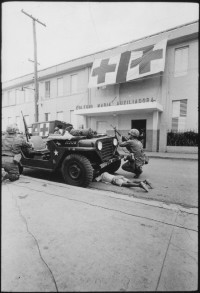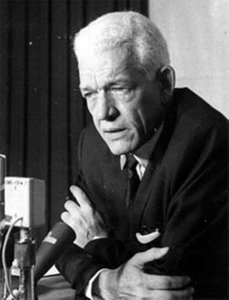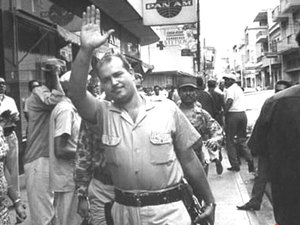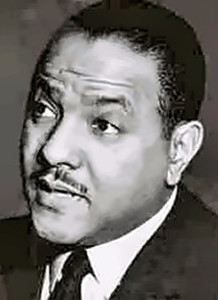Note: Our accounts contain the personal recollections and opinions of the individual interviewed. The views expressed should not be considered official statements of the U.S. government or the Association for Diplomatic Studies and Training. ADST conducts oral history interviews with retired U.S. diplomats, and uses their accounts to form narratives around specific events or concepts, in order to further the study of American diplomatic history and provide the historical perspective of those directly involved.
Immediately following the assassination of General Rafael Trujillo, known as "El Jefe," the Dominican Republic was in shambles. The nation was under the control of a three-man junta which, with the help of the United States, was preparing for presidential elections. In 1963, Juan Emilio Bosch Gaviño was elected President of the Dominican Republic; that same year, he was ousted from the government by the Dominican military that later established another three-mean junta in Bosch's place.
In 1965, Francisco Alberto Caamaño Deñó led what was known as the Caamaño Revolt, the opening salvo in the Dominican Civil War. Made famous by the violence that ensued in the streets of Santo Domingo, the Caamaño movement aimed to restore Juan Bosch as President, and return the Dominican Republic to a constitutional democracy. The Caamaño revolt resulted in the deployment on April 28, 1965 of U.S. Marines and troops from the Organization of American States (OAS) to the Dominican Republic to restore peace and stability. The American intervention lasted until September 1966. While Bosch did not return to the presidency, the movement ended with the inauguration of Hector Garcia-Godoy as the Provisional President, who is now remembered for his pivotal role in the return of democracy on the island, and his hand in organizing the 1966 elections.  This account was compiled from an interview by ADST with Serban "Val" Villimarescu in 1989, who was the Political Affairs Officer in the Dominican Republic following the assassination of General Trujillo. Read the entire account on ADST.org. VALLIMARESCU: We had broken relations with the Dominican Republic during the last year of Trujillo who had been assassinated a year before I arrived. The country was being run by a civilian junta headed up by a very distinguished elderly gentleman, a lawyer, [Rafael Filiberto] Bonnelly, and they were getting ready, presumably, to have elections.
This account was compiled from an interview by ADST with Serban "Val" Villimarescu in 1989, who was the Political Affairs Officer in the Dominican Republic following the assassination of General Trujillo. Read the entire account on ADST.org. VALLIMARESCU: We had broken relations with the Dominican Republic during the last year of Trujillo who had been assassinated a year before I arrived. The country was being run by a civilian junta headed up by a very distinguished elderly gentleman, a lawyer, [Rafael Filiberto] Bonnelly, and they were getting ready, presumably, to have elections.
Our Ambassador, John Bartlow Martin, was a writer and journalist of sorts from Chicago, a political appointee and a decent gentleman, but he didn't know much about the outside world, really. The Ambassador and Washington wanted to have free, democratic, U.S.-style elections in the Dominican Republic immediately, if not sooner. I took a different position in writing and orally.
I said, "These people are 75 percent illiterate. They've had 40 years of brutal dictatorship. They don't know what it means to have a free election. Why don't we let this junta, which is a decent, civilized junta, stay in power for a while and we help build up the institutions, help them economically, educate them a bit? You're going to have an election overnight? They don't know what it means. They'll vote for anybody." But I did not prevail.
So we put out comic books about how to vote, pamphlets on voting procedures, etc. We had an election and Mr. Juan Bosch (in photo) was elected president of the Dominican Republic - someone I never trusted. He took office about two months later. He went on a trip and came back two days before his inauguration. He was supposed to be met triumphantly at the airport, but there was such a mob scene they decided to take him by helicopter to the headquarters of the Dominican radio and television studios where he would make a speech to the people.
Alice and I had in our house three American journalists from the 50 or so who had come for the inauguration. None of them spoke Spanish. I didn't interpret as it went along; I told them I'd give them a summary at the end.
After the speech I said, "Before I tell you in detail what he said, I want to tell you that he just committed political suicide."
"Why do you say this?"
"Because he has denounced, in the most outrageously violent terms, three sectors of Dominican society without which he will not be able to govern: the church, the armed forces, and what he called the oligarchy. He has committed political suicide."
"Do you mean you don't think he's going to serve out his four-year term?"
I said, "No way!"
"Well, how much time would you guess?"
"I'd say maybe eight months or so." Well, after nine months he was overthrown.
It just so happened that the Ambassador and the political section of the embassy hitched their star, our star, totally to Juan Bosch, ignoring even the political opposition. The Ambassador was sort of a pet of Bosch. Whatever Bosch wanted, Bosch got. I issued warnings -- again, in writing and orally -- saying, "This man cannot be trusted." "Oh, no, he's very democratic, very pro-American."
"Oh, no, he's very democratic, very pro-American."
I said, "No, sir, he's not. I know him better than you do." The Ambassador used to send me on missions to Bosch and I knew from friends that he made fun of the Ambassador and of the United States in his intimate circle.
Well, Juan Bosch was a catastrophe. He was overthrown. He was overthrown by the military, and they set up a three-man civilian junta. Our reaction was to suspend diplomatic relations, withdraw the Ambassador and leave a skeleton staff. I was part of the skeleton. The Ambassador, at the airport, when we said goodbye to him, said to me, "Val, you'll see, the people of the Dominican Republic will rise up in arms, outraged by this military coup."
Obviously they didn't rise up in arms. The worse part was that we suspended aid and withdrew our massive AID [Agency for International Development] mission that we had there.
When Kennedy was assassinated, we were in Santo Domingo and the embassy organized a service at the Cathedral. The entire three-man junta, all of whom were personal friends of mine and very decent people, were all there at the church. After the service one of them, Donald Reed Cabral, who at the time was Chairman of the Junta, asked to come to our house for a drink. After we talked about the tragedy he said, "Val, if you have any influence, can you see if relations can be renewed? Now there is a chance, because there will be a new president, Johnson, for you to renew relations with us. Our economic, financial situation is terrible now and if something isn't done there will be total chaos and the real gorillas will take over."
Johnson did decide. It was one of his first moves to renew relations with the Dominican Republic and to resume aid. Obviously the aid program was taking a long time to make its effect. By 1965, I wasn't there any more, the situation had deteriorated to such a point that you had the Caamaño (in photo) revolt, and we had to send in the Marines....
When all hell broke loose in the Dominican Republic, I participated once in a meeting, 24 hours after this happened, with Tom Mann, President Johnson and a few other people. Tom Mann turned to me and said, "Val, would you send the Marines if you were President of the United States?"
I said, "Yes, Mr. Secretary, by all means I would. But we should have OAS [Organization of American States] participation." This was the consensus.
I was sent to Santo Domingo to be the spokesperson. My first two briefings were very successful. I remember once I referred to the Caamaño forces as "the enemy," and one wise guy said, "Oh, an enemy. You call Caamaño an enemy?"
I said, "Well, people who shoot at you are generally not your friends." They liked that.
Anyway, the first two briefings were all right, pretty good. But then they started expanding the security perimeter without telling me, the press spokesman. Then statements were made in Washington by President Johnson that the Caamaño people were murdering civilians right and left, and the streets of Santo Domingo, or the sector controlled by them, were littered with corpses. They gave out, in Washington, lists of names of people who had been killed, executed. They gave out, without my knowing, lists of Cuban agents who had been identified and who were with Caamaño.
I remember I was faced by questions. This was the first I had heard that this statement had been made by the White House. Nobody would tell me. You can imagine what it is to brief journalists who are more informed about what's going on than you are.
The third day, at the request of one or two foreign embassies which had not been included in the security perimeter, General Palmer decided to enlarge the security perimeter, which involved some clashes with the Camaaño forces. So I'm faced by Bob Berrelez of the AP [Associated Press news agency]. He says, "Hey, Val, why did they enlarge the perimeter?" "Wha, wha, what? What perimeter?" I had been in the residence with General Palmer and at General Palmer's headquarters, and they never told me. I told Washington to tell them to keep me informed or I would give up.
"Wha, wha, what? What perimeter?" I had been in the residence with General Palmer and at General Palmer's headquarters, and they never told me. I told Washington to tell them to keep me informed or I would give up.
So about the fourth day I was a nervous wreck and had a briefing session. I am informed that, in order to help me, John King, who was then working for the Assistant Secretary for Public Affairs, would come from the State Department.
I had started a new technique. I tried not to have regular 4 o'clock briefings but to brief as many individual journalists whom I knew, individually, and that was working out pretty well. But I had scheduled for that day a 4 or 5 o'clock press briefing, and John King was going to be there to help me. He said, "You know, Val, it is very important that this come out well because my boss's career is at stake. If it doesn't come out well he may lose his job."
I said, "Fella, do you realize what's going on here?" And all of a sudden, they're shooting. I said, "Duck, John, duck!" He did duck. Two bullets came in through the window -- bullets which I presented to Carl Rowan (at left) when I came back. 
John says, "Oh, my God, this is really serious!"
And I said, "You'd better believe it's serious!"
We get down to the briefing, and I must say I couldn't cope with it - although people who saw it on television said I did well. I couldn't cope with it.
Q: Why didn't they inform you? Why didn't they keep you up to date?VALLIMARESCU: I don't know. I really don't know. Looking back on it, Palmer, as a military man, considered all these movements' military movements, not to be known to the press. And [Ambassador] Tap Bennett, largely because he had lost control of the situation was scared, panicked and couldn't focus on this very important priority. And also the problem was that things were being done in Washington.
Johnson wanted to prove something - wanted to prove that this was Cuban originated, wanted to prove that Camaaño was a real SOB and was murdering people - and they released things that could not be checked on. Some of the supposed Cuban agents were nonexistent or were dead.
Q: Where was the White House getting its information? VALLIMARESCU: From the other agency [CIA], I guess. I don't know. It was a mess. But I do remember there was one positive thing to it -- it was not all negative.
There was a man named Hector Garcia Godoy. The important thing was that once the Camaaño thing was almost finished - the military operation was fairly successful - we and others were looking for someone to become president of the Dominican Republic. Someone with good credentials, someone honest, a man of integrity. The one man whose name came up most often was Hector Garcia-Godoy, whom we had known very, very well. He had been Ambassador to London and came back to the Dominican Republic to have a big job in the Foreign Office when we were there in our previous incarnation.
So, Hector Garcia-Godoy lived across the street. One night I went over there, dropped in uninvited. He gave me a big abrazo [hug] and we spoke for three or four hours.I said, "Hector, you are the only one who is respected enough by all sides, who can take over as president. Accept the presidency and save the Dominican Republic."
He was very reluctant. He didn't know if he could carry it off. I think I helped there because he did accept the presidency. So, anyway, that was one positive aspect of my rather nightmarish visit during that period: I think I helped convince Hector Garcia-Godoy to become President of the Dominican Republic.
